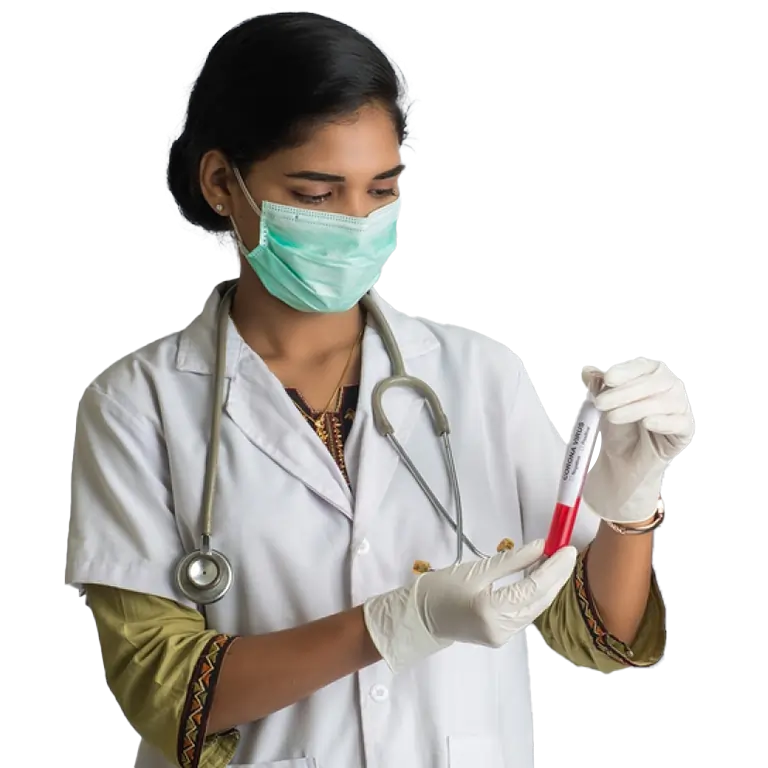- Sample: Blood
- Gender: male
- Required: Blood
- TAT: 24 hours
- Notes: No Fasting
only at 1000 AED
Total test
About test
Total test
Diabetes:
- Glycated Hemoglobin (A1c) Test: Measures average blood sugar levels over the past two to three months.
- Fasting Blood Sugar Test: Checks blood sugar levels after an overnight fast.
- Oral Glucose Tolerance Test (OGTT): Measures the body’s ability to metabolize glucose.
Heart Disease:
- Cholesterol Blood Test: Assesses levels of cholesterol, including LDL and HDL cholesterol.
- Electrocardiogram (ECG or EKG): Records the heart’s electrical activity.
- Stress Test: Evaluates heart function during physical activity.
Cancer:
- Mammogram: Screens for breast cancer by imaging the breast tissue.
- Colonoscopy: Examines the colon for signs of colorectal cancer.
- Pap Smear: Screens for cervical cancer by detecting abnormal cell changes.
Chronic Respiratory Diseases (e.g., COPD):
- Spirometry: Measures lung function by assessing the amount and speed of inhaled and exhaled air.
- Chest X-ray: Images the chest to detect lung-related abnormalities.
Chronic Kidney Disease:
- Blood Pressure Measurement: Regular monitoring is crucial as high blood pressure can contribute to kidney damage.
- Creatinine Blood Test: Assesses kidney function by measuring waste product levels in the blood.
- Urinalysis: Examines urine for signs of kidney problems.
About test
Diabetes:
Glycated Hemoglobin (A1c) Test:
- Procedure: A simple blood test that measures the percentage of hemoglobin with glucose attached over the past two to three months.
- Normal Range: Below 5.7%
- Indications: Monitoring long-term blood glucose control in individuals with diabetes.
- Interpretation: Higher levels indicate poorer blood sugar control over an extended period.
Fasting Blood Sugar Test:
- Procedure: Measures blood glucose levels after an overnight fast.
- Normal Range: Below 100 mg/dL
- Indications: Screening for diabetes or assessing overall blood sugar levels.
- Interpretation: Elevated levels may suggest impaired glucose metabolism.
Oral Glucose Tolerance Test (OGTT):
- Procedure: After fasting, a glucose solution is ingested, and blood sugar levels are measured at intervals.
- Normal Range: A two-hour blood sugar level below 140 mg/dL.
- Indications: Confirming diabetes diagnosis or assessing glucose tolerance.
- Interpretation: Elevated levels may indicate impaired glucose tolerance or diabetes.
Heart Disease:
Cholesterol Blood Test:
- Procedure: Measures total cholesterol, LDL cholesterol, HDL cholesterol, and triglycerides in a blood sample.
- Normal Range: Total cholesterol below 200 mg/dL, LDL cholesterol below 100 mg/dL, HDL cholesterol above 40 mg/dL for men and 50 mg/dL for women.
- Indications: Assessing cardiovascular risk.
- Interpretation: Abnormal lipid levels may contribute to atherosclerosis and heart disease.
Electrocardiogram (ECG or EKG):
- Procedure: Electrodes are placed on the skin to record the heart’s electrical activity.
- Normal Result: Regular rhythm and no signs of ischemia.
- Indications: Assessing heart rhythm, detecting abnormalities.
- Interpretation: Irregularities may indicate heart conditions such as arrhythmias.
Stress Test:
- Procedure: Monitors heart function during exercise or induced stress, often on a treadmill or with medication.
- Normal Result: No abnormal changes in heart rate or rhythm during stress.
- Indications: Evaluating cardiovascular function under stress conditions.
- Interpretation: Abnormal responses may suggest coronary artery disease.
Cancer:
Mammogram:
- Procedure: X-ray imaging of breast tissue to detect abnormalities.
- Normal Result: No masses or calcifications.
- Indications: Breast cancer screening in asymptomatic individuals.
- Interpretation: Detected abnormalities may require further investigation.
Colonoscopy:
- Procedure: A flexible tube is inserted to examine the colon, and abnormalities like polyps can be removed.
- Normal Result: Absence of abnormal growths.
- Indications: Screening for colorectal cancer or investigation of gastrointestinal symptoms.
- Interpretation: Polyps or abnormal tissue may require biopsy or removal.
Pap Smear:
- Procedure: Collection of cervical cells for examination under a microscope.
- Normal Result: No abnormal cellular changes.
- Indications: Screening for cervical cancer in women.
- Interpretation: Abnormal cells may indicate precancerous or cancerous changes.
Chronic Respiratory Diseases (e.g., COPD):
Spirometry:
- Procedure: Measures lung capacity and airflow by having the individual breathe into a device.
- Normal Result: Normal forced expiratory volume in one second (FEV1) for age and gender.
- Indications: Assessing lung function, diagnosing respiratory conditions.
- Interpretation: Reduced lung function may indicate conditions like COPD.
Chest X-ray:
- Procedure: Imaging of the chest to identify lung abnormalities.
- Normal Result: Clear lung fields without signs of inflammation.
- Indications: Investigating respiratory symptoms, screening for lung conditions.
- Interpretation: Abnormalities may suggest lung diseases or infections.
Chronic Kidney Disease:
Blood Pressure Measurement:
- Procedure: Regular monitoring of blood pressure, with appropriate cuff size and technique.
- Normal Range: Below 120/80 mm Hg is considered normal.
- Indications: Monitoring hypertension, a common cause of kidney damage.
- Interpretation: Elevated blood pressure may contribute to kidney dysfunction.
Creatinine Blood Test:
- Procedure: Measures creatinine levels in the blood.
- Normal Range: 0.84 to 1.21 mg/dL for adult males, and 0.66 to 1.06 mg/dL for adult females.
- Indications: Assessing kidney function.
- Interpretation: Elevated levels may indicate impaired kidney function.
Urinalysis:
- Procedure: Examination of a urine sample for abnormalities.
- Normal Result: Absence of protein, blood, or other signs of kidney problems.
- Indications: Screening for kidney disease or assessing urinary tract issues.
- Interpretation: Abnormalities may indicate kidney dysfunction or urinary tract conditions.
RELATED HEALTH CHECKUPS

Diabetes Tests
- Sample: Blood
- Gender: male
- Required: Blood
- TAT: 24 hours
- Notes: No Fasting
only at 1000 AED

Heart Disease Tests
- Sample: Blood
- Gender: male
- Required: Blood
- TAT: 24 hours
- Notes: No Fasting
only at 1000 AED

Cancer Screening Tests
- Sample: Blood
- Gender: male
- Required: Blood
- TAT: 24 hours
- Notes: No Fasting
only at 1000 AED

Chronic Respiratory Disease Tests
- Sample: Blood
- Gender: male
- Required: Blood
- TAT: 24 hours
- Notes: No Fasting
only at 1000 AED

High-quality & affordable diagnostic solutions at your doorstep.
GET IN TOUCH
We understand that feeling heard and seen is one of the most important parts of medical care. Members of our medical team are standing by to answer any question you might have, no matter how small. Contact us by email or phone, and we’ll respond as soon as possible.
CONTACT US
- +971 600552277
- Al Khayyal Building No. 105 - Dubai - United Arab Emirates
CONTACT US
- [email protected]
- 24 x 7 365 days a year

